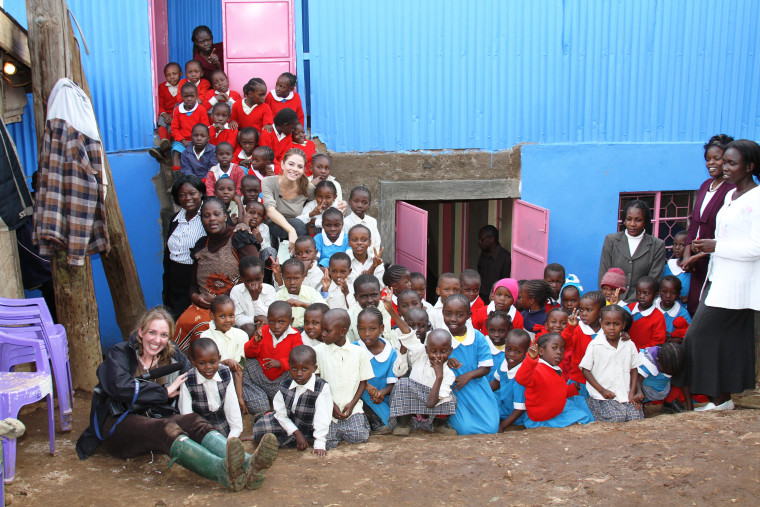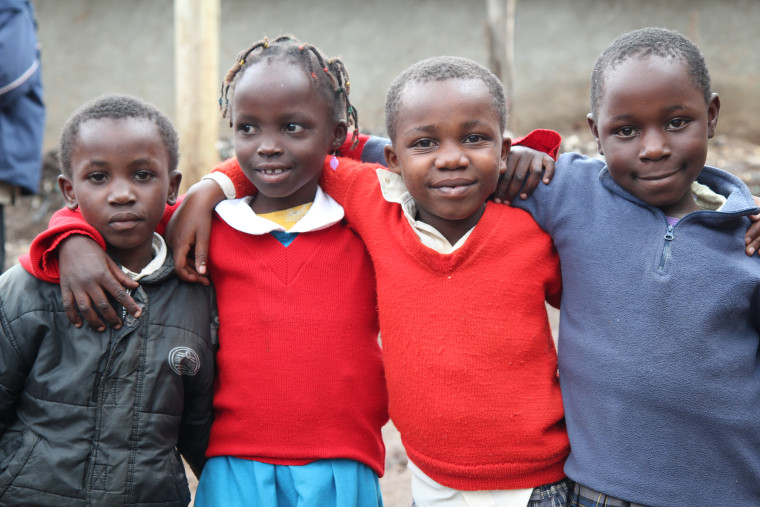Dreams are a luxury few can afford in Kenya’s largest slum. That is, until you turn the corner, walk down a small alleyway and arrive at a bright pink and blue makeshift building. Little girls in bright red sweaters and bright blue skirts are running around, giggling and playing, indoors and out. And when you look at the mud on their shoes, or the tin houses that surround the school, you come to realize that 60 little girls are getting the chance of their lives and they know it. This is the Kibera School for Girls – a refuge from abuse and hunger.
Girls in Kibera generally don’t have a lot of reason to sing or play. Like most young girls in extreme poverty all over the world, they have little value in their communities. They mostly can’t afford school, are highly vulnerable to sexual crime at any early age and, up until recently, have received the least amount of attention from international NGOs. The cover of the ECONOMIST in 2010 was stark: GENDERCIDE What happened to 100 million baby girls?
Maria Menounos and I were shocked by the statistics, especially because the solutions can be so simple. If they are lucky enough to have access to a school, and to stay there, girls have less risk for exposure to HIV, are less likely to get married early or get pregnant, and are more likely to fight for their own rights, raise healthy children of their own and enter the workforce. This very concept has been highlighted in a compelling campaign by the NIKE foundation. ‘The Girl Effect” campaign argues that girls can be game changers in the economic development of a country if they get help them bypassing the extreme challenges they face from birth. It’s also what many other organizations including CARE, the organization we traveled with, are focused on entirely.
In many communities where resources are already stretched to the breaking point, girls are generally last in line. But simple interventions, like the one we showed last night that created a sports program only open to girls, can have profound impact – and the increase in the self-confidence that these young girls display when they come to believe in their own strength and physicality is dramatic. There are more fundamental limitations to women and girls growth though. In the US, there were “head and master” laws on the books till the 1970’s that gave the husband say over most family decisions. Many still exist in countries all over the world. In Kenya, women do 70 percent of the agriculture work but under five percent actually own land.
The school featured in our Making a Difference report has taught the community to invest in the education of their girls. The families invest in their girls’ education, and contribute time to the school and, by doing so, the entire family receives health care, access to clean water and even clean toilets they don’t have to pay to use.
One of the co founders of the Kibera school for girls, Kennedy Odede told me: “People see hope and people are really surprised. And most are overwhelmed, because it's unbelievable. There's no way an organization in the slum can be able to do this amazing thing, you know. There's no way our girls could get an education. No way to get a health clinic. What I really love is that I kind of show a hope to those who are hopeless, who never went to school. There's a better life for you.”

He should know. He’s from there. He grew up watching the young girls around him sell sex for food because even someone without an education or any job prospects still needs to eat.
And that’s why the school is one of the most remarkable places I have ever visited. The founders not only continue to teach the community girls have value but they have also given these little girls a safe place to dream. As Kennedy said,” They have passed through horrors. I am welcoming them back to a world they never lived in, to a world where they are important.”
To find out more:
